News & Stories
2018
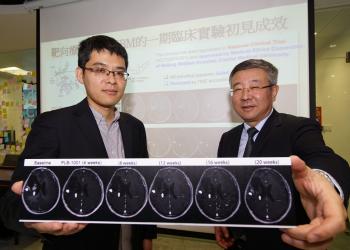
News
HKUST Researchers Discover Mutation Route That Helps Find New Therapeutic Lead for Deadly Brain Cancer Patients
A research team consisting of scientists from the Hong Kong University of Science and Technology (HKUST) and Beijing Tiantan Hospital have uncovered the mutational mechanism of how a rare and deadly brain cancer –secondary glioblastoma (sGBM) – progresses from its less lethal type. The groundbreaking finding has provided a therapeutic lead which may develop into a new kind of treatment for chemo-resistant patients.
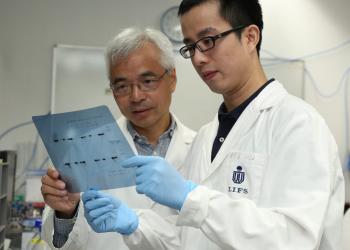
News
HKUST Scientists Rebuild Synapse-like Machineries to Unveil its Formation and Regulatory Mechanism Paving Ways for Diagnosis and Early Intervention of Mental Disorders
A research team led by Prof Mingjie Zhang, Kerry Holdings Professor of Science in the Division of Life Scienceat The Hong Kong University of Science and Technology (HKUST), has employed a novel biochemical reconstitution approach to show how proteins in postsynaptic density (PSD) are regulated in synapses to process and transmit brain signals, which may provide insights into further research on early detection and intervention of mental disorders such as autism and schizophrenia.
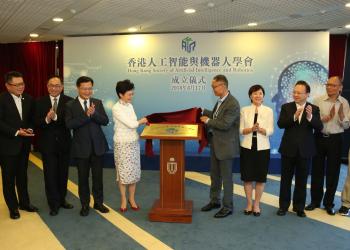
News
HKUST Hosts Xiangshan Science Conference on Neuromorphic Computing & Artificial Intelligence and Hosts Launching Ceremony for Hong Kong Society of Artificial Intelligence and Robotics
Nearly 40 distinguished scholars from Hong Kong, Macau and the Mainland attended the two-day Xiangshan Science Conference hosted by The Hong Kong University of Science and Technology (HKUST) yesterday. The Honourable Mrs Carrie Lam Cheng Yuet-ngor, Chief Executive of HKSAR, Mr Chen Dong and Dr Tan Tieniu, Deputy Directors of the Liaison Office of the Central People’s Government in HKSAR officiated at the closing ceremony of this high-profile conference today, which was founded by the State Science and Technology Commission (now the Ministry of Science and Technology of the People’s Republic of China, PRC) and the Chinese Academy of Sciences.
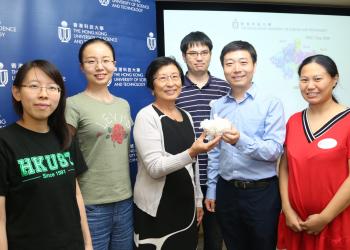
News
HKUST Scientists Determine Atomic Structure of DNA Replication Machine to Make Groundbreaking Discovery of DNA Replication Mechanism
Cells propagate by making copies of themselves through replicating their DNA genome, which are blueprints of their identities. Every full grown human came from a single fertilized egg cell whose genome is replicated approximately 10 million-billion times. What does the molecular machine that carries out this Herculean task look like? A research team led by scientists from the Hong Kong University of Science and Technology (HKUST) have determined the three dimensional structure of the DNA replication machinery at atomic resolution for the first time in history.
When DNA replication was first proposed based on its double helix structure over half a century ago, many believed that deciphering the machine that separates the two strands of DNA for replication is near to come. However, it turns out to be a much complicated task due to the large size, multi-partite nature (made up of three engines) and its flexibility of the machine.
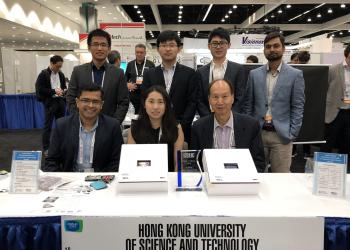
News
HKUST Develops a New Generation of LCD with Higher Efficiency, Resolution and Color Performance
A research team from the State Key Laboratory on Advanced Displays and Optoelectronics Technologies of The Hong Kong University of Science and Technology (HKUST) has developed a new Liquid-crystal display (LCD), which image resolution, energy efficiency as well as color saturation were markedly enhanced, achieving a crucial breakthrough in display technology.
Known as Active Matrix Ferroelectric Liquid Crystal Display (FLCD) - this latest technology developed by a research team led by Chair Professor from the Department of Electronic and Computer Engineering Prof Kwok Hoi-Sing, will see energy efficiency jumped by 3-5 times, and image resolution enhanced by three times – at a lowered cost.
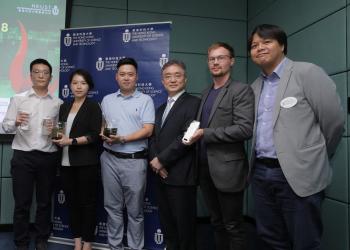
News
HKUST-Sino One Million Dollar Entrepreneurship Competition 2018 Sees Innovative Entrepreneurial Ideas
Three teams comprising HKUST students, alumni and their international peers have won over 100 contesting teams to gain the top three prizes of the HKUST-Sino One Million Dollar Entrepreneurship Competition 2018. They will compete with the finalists from six different cities in the Grand Final to be held at the University’s Fok Ying Tung Research Institute, Nansha in August.
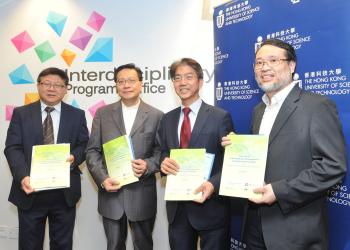
News
HKUST Launches New Master Program in Public Policy and Reveals Report on I&T Development of Greater Bay Area
The Hong Kong University of Science and Technology (HKUST) is pushing forward its public policy research and education as the Institute for Public Policy (IPP) published today the first report on the integrative development of innovation and technology (I&T) in the Greater Bay Area, and the University is set to launch the city’s first two-year full-time taught postgraduate public policy program specialized in science, technology and environmental policy.
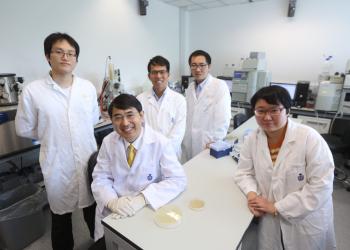
News
HKUST Discovers New Antibiotics Resistance Mechanism Paving the Way for Design of Antibiotics Against Superbugs
Researchers at The Hong Kong University of Science and Technology (HKUST) have identified for the first time the culprit behind the causing of broad-spectrum bacterial resistance to peptide antibiotics - widely perceived as the last-line of defense against antibiotic-resistant bacteria, opening a new direction to the design of new drugs in tackling superbugs.
The discovery – made by Chair Professor from the Division of Life Science Prof Qian Pei-Yuan and his fellow researchers, came in the best moment as the team has also discovered that this enzyme, which they identified as the cause of broad-spectrum bacteria resistance against peptide antibiotics, was actually found in not just a few, but many different strains of bacteria, sounding an alarm against persistent improper use of antibiotics.








